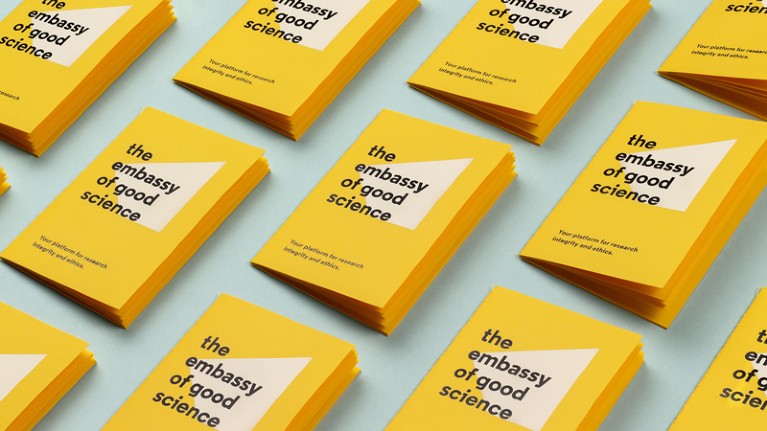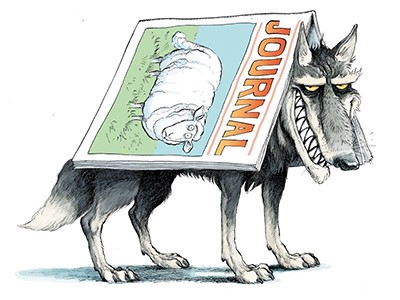
The Embassy of Good Science connects researchers to each other and to policymakers.Design by Amsterdam design studio Momkai
When it comes to research integrity, scientists use the language of aspiration, whereas policymakers talk about hard rules and enforcement.
That’s one conclusion from an in-depth analysis of published research and policy documents in research integrity (S. P. J. M. Horbach and W. Halffman Sci. Eng. Ethics 23, 1461–1485; 2017). There are other disconnects, too. Countries, disciplines and sectors often approach integrity in different ways. For some, it can be confined to preventing data fabrication, falsification and plagiarism. But integrity is much broader, encompassing quality and relevance, as well as recognition of diversity and inclusion.
The need for a unified approach is slowly gaining recognition. The World Science Forum, a biennial meeting of researchers and policymakers from different countries, issued a declaration at its November conference in Budapest that called for, among other things, “harmonisation and enforcement of standards of conduct of scientific research across borders and across public and private research”. The declaration also supported processes by which scientists “can report suspected research misconduct and other irresponsible research practices, without fear of reprisal”, and it urged clearer procedures for responding to such concerns.
Raising research quality will require collective action
These proposals echo many national and international guidance documents that have been produced since 2010, when the Singapore Statement on Research Integrity billed itself as the first international effort to unify approaches to integrity. Subsequent guidelines have included the Bonn PRINTEGER Statement, the All European Academies Code of Conduct for Research Integrity, the Netherlands Code of Conduct for Research Integrity and many more.
But none yet has the globally respected status of, say, the 1964 Declaration of Helsinki, which is widely accepted as the standard for the ethical treatment of human participants in medical research. And that raises the question: how can the burgeoning official declarations actually enhance research integrity in the lab?
For the working researcher, complying with a research-integrity policy can sometimes feel like another unwelcome burden — yet another form to fill in, set of data to record or online system to feed. And because these policies are often handed down from the directors, that can make workers unwilling to accept that these practices are something that everyone benefits from and needs to engage with.
Predatory journals: no definition, no defence
That’s where local, community-driven efforts are offering a way forward. In a World View article, Marcus Munafò at the University of Bristol, UK, describes how one network of universities and journal publishers is enabling members to exchange ideas on integrity, which could lead to consensus about practices such as promoting transparency and data sharing. And in a Comment article, a multinational team of researchers and publishers presents a consensus definition of predatory journals. This is a welcome and genuinely collaborative effort, the result of many rounds of discussion between researchers, institutional leaders and patient representatives, among other stakeholders.
Networks for integrity are emerging in the global south, too, such as the African Research Integrity Network, which was established in 2017, and the Asia Pacific Research Integrity Network, set up two years earlier, in 2015.
Perhaps some of the most exciting grass-roots efforts are those that connect researchers to each other and to policymakers. The Embassy of Good Science is one such platform. Established under the European Union’s Horizon 2020 research programme, it styles itself as a ‘public square’ where researchers can find guidance and share knowledge. It contains links to national ethics codes and articles explaining good practice.
Official declarations about research integrity can sometimes be perceived by researchers as statements of the obvious, particularly because researchers regard the pursuit of science itself as upholding values of fairness, honesty and scepticism. Policy documents, moreover, can be viewed warily by researchers as a list of commandments handed down from on high, chiselled into stone tablets.
But rules and policies are needed — and they can be most effective when they arise as a result of engagement with grass-roots communities. Local efforts might not produce the global unity and consistency of high-level statements, but they have a much higher chance of changing researchers’ daily practices, and thus making a genuine difference to integrity in research. The lesson here is familiar: change will come when we work alongside the communities we wish to change.

 Predatory journals: no definition, no defence
Predatory journals: no definition, no defence
 Raising research quality will require collective action
Raising research quality will require collective action
 Research integrity is much more than misconduct
Research integrity is much more than misconduct
 A code of ethics to get researchers talking
A code of ethics to get researchers talking
 Integrity starts with the health of research groups
Integrity starts with the health of research groups
 Faculty promotion must assess reproducibility
Faculty promotion must assess reproducibility





